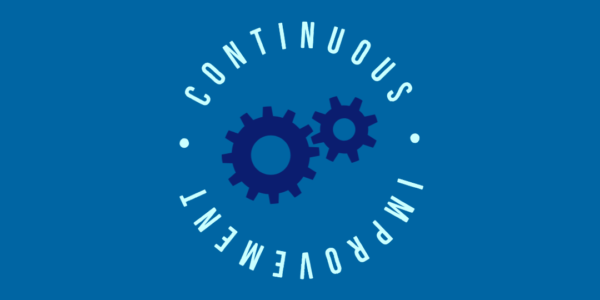Kaizen is a philosophy first practiced by Japanese businesses after World War II. The Japanese word kaizen translates to “change for better”. In manufacturing and business terms, kaizen is defined as “continuous improvement”. Small changes contribute to a significant outcome.
Although this philosophy may have its origins in business and manufacturing, the practice is applied in many other fields such government, life coaching, banking, and healthcare. Toyota, Ford, and Nestlé all implement the kaizen philosophy.
How does Kaizen work?
At its core, Kaizen is about continuously looking for ways to improve and implementing small changes that contribute to a significant result. It’s not about constantly seeking a revolutionary or game-changing idea, though. Kaizen focuses on establishing good practices and making small adjustments to optimize a system.
Improving quality is one of the main facets of this philosophy. This includes improving the quality of a final product, but also improving the quality of work that employees perform and improving the quality of the work environment.
Kaizen is not synonymous with lean manufacturing, but the two practices share fundamental principles. Eliminating waste and inefficiencies is the name of the game in lean manufacturing. Kaizen is about constantly looking for ways to improve business practices, such as eliminating waste and inefficiencies.
Everyone, everyday, everywhere
Kaizen isn’t something that you pencil in on your schedule. It’s a philosophy that you apply every single day. It looks at all aspects of your business, and it includes everyone who works within your business.
Improvements can come from anyone, not just the higher ups. It doesn’t require the owner or management to come up with a good idea. Anyone can identify opportunities to improve a process.
Little changes like adding music can improve the mood on the floor, boost morale, and create a positive work culture. Reducing waste materials, streamlining your shift rotation, and cutting out inefficiencies in the supply chain all fall under the umbrella of kaizen.
Look for ways to improve
One often overlooked area in which manufacturers can improve is maintenance. Instead of waiting until there’s an error code or a shutdown, stay ahead of the problem. We recommend routine maintenance and inspection for Indramat motion control systems. A regular schedule helps prevent unscheduled maintenance and downtime.
Call 479-422-0390, or contact us online, for preventive maintenance or inspection for Indramat motion control systems.
While people typically attribute kaizen to business, the philosophy doesn’t stop when you’re off the clock. Once you you start applying this philosophy in your work, you start applying it everywhere in life. You can’t achieve perfection, but that doesn’t mean you shouldn’t try for it. There is always room for improvement.
